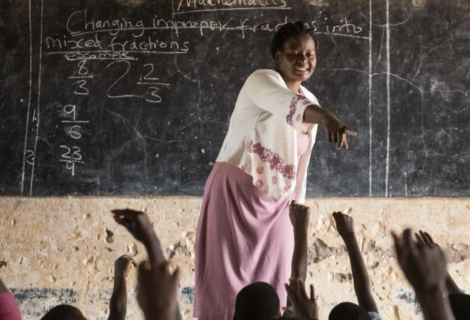IMF Annual Meetings: Austerity is not a solution, it’s a cycle of harm, says ActionAid

ActionAid has condemned the International Monetary Fund (IMF) for continuing to push austerity and budget cuts at its Annual Meetings this week, warning that such measures will devastate millions already facing rising inequality and economic uncertainty, especially in low-income countries.
Roos Saalbrink, Economic Justice Lead, ActionAid International said: “We needed urgent action on debt, but instead the IMF has doubled down on austerity. Once again, governments are being told to cut budgets and tighten belts, policies that have already left public services in crisis and deepened generational poverty."
“The IMF’s latest advice urges countries to manage global economic turbulence by cutting public spending and removing regulations for the private sector, while remaining largely silent on jobs and labour rights.”
“It’s mind-boggling that the IMF continues to promote public wage bill cuts as a way to create space for social spending. Yet teachers’ salaries make up the largest share of education budgets. You cannot improve education by cutting the very people who deliver it. Without investing in teachers, there is no investment in education.”
“The IMF must abandon its failed austerity playbook and support countries to invest in people, not punish them. We need decent work, and quality public services, not another lost decade of cuts and inequality.”
“All the progress being made on fairer global tax rules risks being wiped out by debt repayments. Instead of funding schools, hospitals, or action on the climate crisis, countries are being forced to send billions back to creditors.”
ActionAid warns that such contradictions are undermining the fight against inequality, especially gender inequality. Redirecting existing funds without expanding public budgets, as the IMF recommends, is a false economy, particularly for low-income countries in the Global South, one that punishes the poorest and rewards private interests.
Furthermore, Niranjali Amerasinghe, Executive Director, ActionAid USA said: “The World Bank and IMF's silence on climate issues was deafening. It's another example of institutions caving to the outsized power of richer countries, in this case the US. There is overwhelming evidence that climate change is a defining economic challenge, disrupting food systems, destroying livelihoods, and driving up debt burdens in climate-vulnerable countries. To ignore this is to deny reality.
“The IMF and World Bank cannot claim to promote economic stability or development while remaining silent on the greatest economic threat of our time. Climate action must be at the heart of economic policy, not an afterthought.”
ENDS